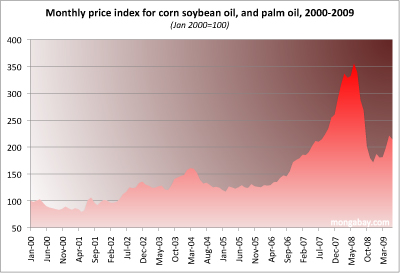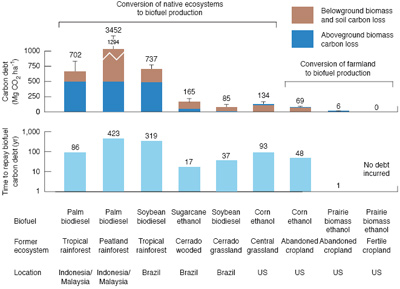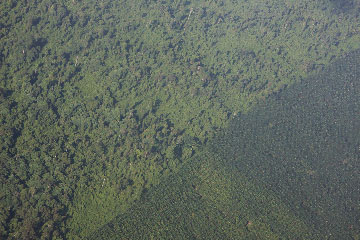Smart biofuels that don't hurt people or the environment are possible
Sustainable biofuels can be a reality but only in combination with reductions in fuel demand and increased productivity on existing agricultural lands, argue researchers writing in the journal Science.
mongabay.com | July 16, 2009
Five years ago biofuels were seen as a panacea for the world's energy hunger and the need to address climate change, but increased production of biofuels soon contributed to a clutch of problems, including competition with food, resulting in rising prices, and large-scale conversion of rainforests and tropical grasslands for feedstocks, resulting in biodiversity loss and increased greenhouse gas emissions. Environmentalists and scientists condemned many biofuels — including ethanol produced from Midwestern corn ethanol and biodiesel generated from European rapeseed and Southeast Asian palm oil — as a short-sighted energy solution. Some biofuels were found to be even worse for the environment, and more costly, than conventional gasoline.
Price index including corn, palm oil, and soybean oil for January 2000 through June 2009. Click chart to enlarge.
However some researchers remain optimistic that smart biofuel production could help meet energy demand without hurting people or the planet. In a Science Policy Forum piece, David Tilman and colleagues explore some of these options, noting that biofuels can be produced in substantial quantities at low environmental cost provided they are derived from feedstocks that have lower greenhouse gas emissions than conventional energy sources and don't compete with food production. The authors highlight several potential feedstocks, including perennial plants grown on degraded and abandoned agricultural land; crop residues; sustainably harvested wood and forest residues; double crops and mixed cropping systems to maximize production between and during harvest cycles; and municipal and industrial waste.
Chart modified from Science. Tilman was co-author of a study published in Science in February 2007 that showed the production of some biofuels can result in emissions greater than those from fossil fuels. The analysis looked at the lifecycle emissions from various biofuel feedstocks and presented the results as a "carbon debt" ranking.
But use of these biomass sources may not emerge on its own, note the authors, who lament that recent biofuels policy dialogue in the United States has become "increasingly polarized" with political influence seeming to trump science.
"The best available science, continually updated, should be used to evaluate the extent to which various biofuels achieve their multiple objectives, and policy should reward achievement," they write.
To this end, Tilman and colleagues suggest three steps to be taken: "meaningful science-based environmental safeguards should be adopted, a robust biofuels industry should be enabled, and those who have invested in first-generation biofuels should have a viable path forward."
Such policy should be supported by "rigorous" accounting rules that "measure the impacts of biofuels on the efficiency of the global food system, greenhouse-gas emissions, soil fertility, water quality, and biodiversity. Accounting rules should consider the full life cycle of biofuels production, transformation, and combustion."
Oil palm plantations near Lahad Datu, Malaysia. Photo by Rhett A. Butler
Without such safeguards, "the massive projected increases in global energy and food consumption will greatly elevate atmospheric greenhouse gas levels from fossil fuel combustion, land clearing, and livestock production and will create immense biodiversity loss from habitat destruction and climate change," the authors warn. "The quality of human life will be compromised."
David Tilman, Robert Socolow, Jonathan A. Foley, Jason Hill, Eric Larson, Lee Lynd, Stephen Pacala, John Reilly, Tim Searchinger, Chris Somerville, Robert Williams. Beneficial Biofuels—The Food, Energy, and Environment Trilemma. SCIENCE 17 JULY 2009 VOL 325













No comments:
Post a Comment